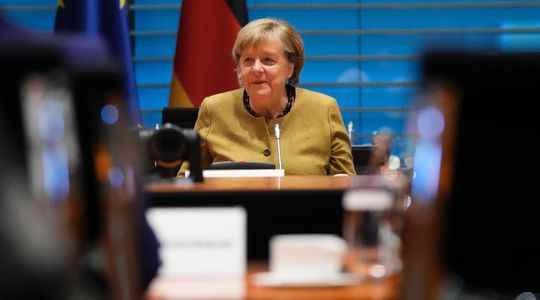In Berlin, the Russian Embassy still sits majestically. In keeping with the long privileged relationship between Germany and the government of Moscow, its monumental building extends over a good hundred meters along the main avenue Unter den Linden, next to its American, British and French counterparts. On the east side, the Russian Embassy is extended by the former deserted offices of Aeroflot, the Soviet-Russian airline struck down by international sanctions, of which only a corny sign perched on the roof continues to bear witness to an old world. West side of the embassy, towards the Brandenburg Gate and a few steps on the same sidewalk, is a building belonging to the Bundestag, which has had a new occupant for a year: Angela Merkel.
On December 8, 2021, Angela Merkel left the chancellery in a virtual triumph, at the height of her popularity despite four successive terms and sixteen years of wear and tear in power. Barely three months later, the world was on fire and she found herself catapulted into the dock. The charges fall mercilessly. The energy crisis in Europe ? It was she who decided to stop nuclear power and linked the continent to russian gas via the Nord Stream gas pipelines. War in Ukraine? It is also she who led Germany into a diabolical energy dependency with Putin’s Russia, with imprudence and naivety.
The former “most powerful woman in the world” is held responsible for the impasse of the German model she embodied, based in particular on exporting to the Chinese market and importing Russian gas at low prices. Ironically, the offices of the retired Chancellor are located a few meters from the Berlin office of the Kremlin. She has a bird’s eye view of the demonstrators who have been challenging diplomats for months with their slogans and their photos of Ukrainian, Syrian and Chechen victims. From its windows, you can also see the facade of Madame Tussauds, the museum of which one of the attractions is its own wax statue.
“Nothing, nothing, I regret nothing”
During her rare public outings, Angela Merkel is entitled to the same questions, those to which Germany and the European Union must now respond urgently. Why did you stop nuclear power without foreseeing the consequences? Why haven’t you diversified gas supply sources? Why did you link Germany’s economy to such unreliable regimes as Putin and Xi Jinping? Did she overestimate Putin’s rationality, wrongly exclude Ukraine’s entry into NATO in 2008, miss the Minsk negotiations? We would like her to apologize to expiate her faults. Social Democratic President (SPD) Frank-Walter Steinmeier, he was confused in regret and remorse. Because he is still in office, and because in the coalition governments with Angela Merkel, the SPD ministers such as Sigmar Gabriel in the Economy and Mr. Steinmeier in the Foreign Affairs know very well that they were, even more than the Chancellor, in favor of a deep relationship with Russia and Nord Stream, the famous controversial pipeline that embodies it. But also the current Chancellor Olaf Scholz.
Angela Merkel, as usual, will disappoint those who expect words and emotion from her. However, he sometimes apologized for a mistake, and even asked for “pardon”, during the Covid pandemic, for having tightened confinement on an Easter weekend. But this time, without discarding or passing the responsibility on to her ministers, she remains in the mode “Nothing at all, I regret nothing”. She says she has “worked a lot to preserve the Ukrainians and give them time to prepare militarily”. To a relative, she confided that she “did not see when (she) could have acted differently”, but that she was thinking in order to determine “with honesty” if this was the case. “It’s too simple to judge history in light of the present,” she added.
The result of Merkel’s slow reflection will be engraved in the book she is writing with Beate Baumann, her faithful collaborator for thirty years. We can count on the leader to weigh her words and bring the same maniacal thoroughness as when she exhausted her counterparts Heads of State and Government by modifying such and such adjective after a long night of European Council. The book, already purchased in France by Albin Michel editions, will be completed at the end of 2023 and published in 2024.
